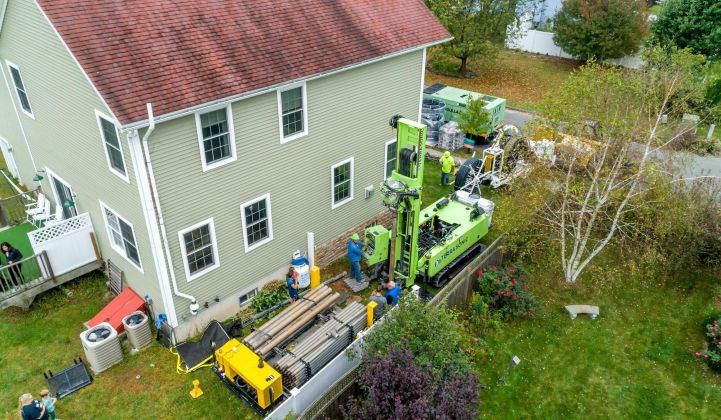Google spinout Dandelion Energy wants to push home geothermal heating to new heights in 2020.
The company, which emerged from the X "Moonshot Factory" in 2017, has grown to around 100 employees and installed hundreds of sites in New York state. It continues to refine its drilling technology to make residential drilling and heat pump installation easier and more competitive with incumbent fossil fuels. Last month, it pulled in another $12 million, bringing total investment to $35 million, and hired a new CEO to handle the growth stage while co-founder Kathy Hannun takes the president role to focus on technology development.
Installations grew nearly fivefold year-over-year in 2019, Hannun said in a recent interview, as the company dialed in on its core markets of Albany, the Hudson Valley and Westchester. Previous investors Comcast Ventures, GV, NEA and Lennar saw that progress and wanted to expand on last year's Series A.
Dandelion is seizing on statewide trends as well. It partnered with utility Con Edison to install geothermal heat pumps in Westchester, where demand for natural gas has outstripped supply, leading to a moratorium on new hookups. The utility offers rebates of up to $5,000 for customers who switch to Dandelion's geothermal heat pumps. And the state Public Service Commission, which regulates utilities, raised heat pump deployment targets and allocated billions in funding for it in a January 16 order.
“We’ve demonstrated that there’s a lot of demand, and we’ve demonstrated that we can install geothermal systems that customers are really happy with,” said newly appointed CEO Michael Sachse. “This year will largely be about getting all our systems in place and processes, so we can take as much complexity out of this as possible.”
The new funding provides “plenty of runway” for the foreseeable future, Sachse added.
Sachse’s appointment as CEO follows his experience at energy efficiency company Opower. He joined when Opower had about 30 employees, then served as chief marketing officer after* the company went public in 2014; it was acquired by Oracle in 2016. That journey had its ups and downs — its stock price lost more than half its initial value by the time of acquisition — but the $532 million deal remains one of the biggest sales achieved by a U.S. cleantech startup.
If Dandelion makes good on its appeal to the millions of New England homes burning fuel oil to stay warm, it’ll need a leadership team that can handle big valuations.
Drill smarter, not harder
Dandelion's technology drills a ground loop 300 to 500 feet below a house and connects it to an electric heat pump. In the winter, installations pump heat from deep underground to warm the house, cutting the need for heating fuel. In the summer, they pump heat from the house into the ground, reducing air conditioning load. Both actions help utilities stressed by peak seasonal heating and cooling needs.
Compared to the myriad companies selling home solar power, Dandelion is notable for the lack of competitors in its lane. In the fight for customers, it must outcompete the status quo — keeping the fuel-based heating system — or a number of local installers. The space hasn't attracted much attention from venture capitalists or technology entrepreneurs.
“This is an industry that’s been served by people with no ability to invest in R&D,” Sachse said. “Our core thesis is that by investing in technology, we’ll make this product cheaper and therefore be able to bring a unique offering to the market.”
That R&D effort includes honing a next-generation heat pump and logging data on soil strata in the regions where the company drills frequently, which allows teams to prepare the best equipment for the geology they’re planning to drill in.
The company already saves customers money compared to fuel oil, Sachse said, and that advantage will only increase as innovation drives down the cost of installation.
Minimize impacts of drilling
Dandelion moved from initially subcontracting the installation work to doing it in-house, to exert more control over the process. Now it plans to improve and expand its fleet of drilling equipment.
Originally, the company used the sort of drills meant for water wells, which typically sit on a very large truck bed. That may be fine for wide-open countryside, but it creates challenges when serving more tightly spaced homes in affluent Westchester, for instance.
"You simply...cannot fit the drill into many yards in our service territory," Hannun said.
So the company took sonic drill technology, used in geotechnical engineering, and modified it for residential use. The team's first sonic drill rig went into action last summer.
"We really tried to optimize for equipment that was much lighter and smaller and more modular, so you can orient the pieces according to the shape of the yard you’re dealing with," Hannun said. "It allows us to serve a lot more homes, and we do so while leaving the yard in a much better condition than a well drill would leave it in."
Now Dandelion can drill for homes it would have had to disqualify because of yards too small to host the larger rig. Focusing on a tighter, denser service territory could lower customer-acquisition costs compared to a more sprawling area. Success in its early markets could unlock broader regional expansion in the Northeast.
*Updated to clarify that Sachse became CMO after Opower's IPO.




